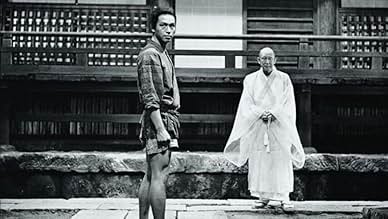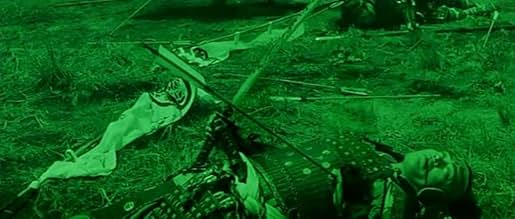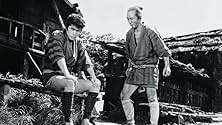A young man decides to become a warrior, causing trouble for his clan.A young man decides to become a warrior, causing trouble for his clan.A young man decides to become a warrior, causing trouble for his clan.
- Director
- Writers
- Stars
- Awards
- 1 win total
Kôshirô Matsumoto
- Sozo, 1st son
- (as Somegoro Ichikawa)
Kichiemon Nakamura
- Yasuzo, 2nd son
- (as Mannosuke Nakamura)
- Director
- Writers
- All cast & crew
- Production, box office & more at IMDbPro
Featured reviews
There's a rare sense of epic artistry in this unusual and striking medieval saga, directed by Keisuke Kinoshita as more of an aesthetic experience than a conventional drama. The film was designed to resemble a decorative 16th century Japanese scroll, painting spare brushstrokes of vivid color across each panoramic, wide-screen black and white image. It can be difficult (and not really worth the effort) to follow the endless progression of characters, and the manner in which the film unfolds is often more involving than the story it presents. Each leap forward in time approximates the turning of another page, usually to the next in a series of pointless, bloody battles between feudal warlords, with each conflict properly labeled beforehand, identifying the date, location, and principals involved. The battle scenes serve as punctuation, following successive generations of peasant soldiers to their doom, with the repetition suggesting that war is the only eternal aspect of the human condition, and passive resistance is futile.
I would really love to see again this film, which I've seen in São Paulo in 1961. Besides the positive aspects mentioned by the reviews already posted, I would emphasize another quality: some events are presented two or three times from the point of view of the different characters. As the events are not organized in chronological order, and the situations, faces and happenings are similar, the film seems absolutely confusing, till you realize what is intended to be shown: the reality is repetitive, but unique for each person, and each event must be understood from different angles. It's a pity that this film is not available on DVD.
I'm not one to usually comment on movies on IMDb, but I think the fact that the only review that shows up on the site says "Depressing" and gives it a low mark, I had to resolve that issue.
This movie is absolutely amazing. Firstly, the scope of the story is really quite amazing. We basically have six generations of one family, and their story. The story itself isn't really complex, but it really does linger in your mind for a while after watching the movie. The basic story is the how futile fighting can be. The acting is top notch, there isn't a bad performance in the lot. I thought the color effects were a little weird, and I'm not sure I understood the point of them. It didn't take away from the movie at all though.
This is an amazing film. Is it sad? Yes, it is, but that doesn't mean it shouldn't be watched. This is really a hidden gem of Japanese cinema, and I'd love to see it get a US release at some point.
This movie is absolutely amazing. Firstly, the scope of the story is really quite amazing. We basically have six generations of one family, and their story. The story itself isn't really complex, but it really does linger in your mind for a while after watching the movie. The basic story is the how futile fighting can be. The acting is top notch, there isn't a bad performance in the lot. I thought the color effects were a little weird, and I'm not sure I understood the point of them. It didn't take away from the movie at all though.
This is an amazing film. Is it sad? Yes, it is, but that doesn't mean it shouldn't be watched. This is really a hidden gem of Japanese cinema, and I'd love to see it get a US release at some point.
This is the saga of a family of farmers, some of whom become distinguished soldiers and even generals. It begins the evening when one of their numbers comes home, having captured an enemy general, earning great praise. That night, his nephew is born, as is the son of the local daimyo. We don't follow the nobleman, but the farmer, as he grows up, is persuaded not to run off to war by getting him a wife, has sons and daughter, and.... well, 'persists' is the best word I can think of, while other men in his family go to war and die, while the women move to town, and go mad, while the river Fuefuki flows outside the house that everyone refers to as an 'insect trap.'
Keisuke Kinoshita's movie is an epic, but it breaks the rules, by being an anti-war epic. It's shot in wide screen, with an aspect ratio of 2.35:1, but it's not shot in color, color is shot through it, in tints and tones and what looks like Handschlegel effects, and gels that color part of the screen like airbrushed clouds. This is the war of the samurai class, so these splashes of color suggest old scrolls. However, that's during battles, and the aftermath. When it's just the peasants, and no one is dying, it's all black and white. Back when this was made, black & white was the film of reality. Color was for fantasy, or perhaps madness. Over all, it's saying "We could do this sort of movie straight and make the Big Bucks. That's not we want to do."
There's quite a cast, and Kinoshita and his regular cameraman, Hiroshi Kusuda, know how to fill that wide, wide screen. The samurai sequences are shot as well as anything that Kurosawa did, but his sequences lack Kurosawa's bravado.... and his humor. Kurosawa's samurai might be stupid, but they are always noble. There are no crippled mothers in Kurosawa, so far as I can recall, hobbling along as fast as a mounted army, begging her sons to come home. There are no samurai killing themselves so they won't suffer the agonies of burning to death, while priests sit calmly. There are no silk merchants burned to death because they dare to be rich in Kurosawa's films.... although perhaps he and his collaborators might write it so they deserve to die for other things. Because they are not samurai, they are merchants, and so they are evil.
Well, Kurosawa's family was a samurai family. I have no idea about Kinoshita's family. In 2019, this looks like going well overboard to make a point. Given the popularity of samurai movies when it was made, I'm not sure.
Keisuke Kinoshita's movie is an epic, but it breaks the rules, by being an anti-war epic. It's shot in wide screen, with an aspect ratio of 2.35:1, but it's not shot in color, color is shot through it, in tints and tones and what looks like Handschlegel effects, and gels that color part of the screen like airbrushed clouds. This is the war of the samurai class, so these splashes of color suggest old scrolls. However, that's during battles, and the aftermath. When it's just the peasants, and no one is dying, it's all black and white. Back when this was made, black & white was the film of reality. Color was for fantasy, or perhaps madness. Over all, it's saying "We could do this sort of movie straight and make the Big Bucks. That's not we want to do."
There's quite a cast, and Kinoshita and his regular cameraman, Hiroshi Kusuda, know how to fill that wide, wide screen. The samurai sequences are shot as well as anything that Kurosawa did, but his sequences lack Kurosawa's bravado.... and his humor. Kurosawa's samurai might be stupid, but they are always noble. There are no crippled mothers in Kurosawa, so far as I can recall, hobbling along as fast as a mounted army, begging her sons to come home. There are no samurai killing themselves so they won't suffer the agonies of burning to death, while priests sit calmly. There are no silk merchants burned to death because they dare to be rich in Kurosawa's films.... although perhaps he and his collaborators might write it so they deserve to die for other things. Because they are not samurai, they are merchants, and so they are evil.
Well, Kurosawa's family was a samurai family. I have no idea about Kinoshita's family. In 2019, this looks like going well overboard to make a point. Given the popularity of samurai movies when it was made, I'm not sure.
Don't let the 4 star vote of one of the previous commentators prevent you from viewing this movie, it conveys much more than only a 'war is futile' message. Many 'good' war movies could be reduced to only this message (could, because mostly in reality they are only cheap propaganda a la 'Waltz with Bashir'), but certainly not this movie. As another commentator said, it lingers in your mind for a while after watching it and in this aftermath I really began to realize how meaningful and elaborate each scene or part of the story of the movie was. In one judgment sharptongue was right, though, the movie is depressing, and not only slightly. I don't want to spoil anything so let me only say that if you liked movies like 'Seven Samurai' this one is also for you.
Did you know
- TriviaFinal film of Kuniko Igawa.
Details
- Release date
- Country of origin
- Language
- Also known as
- La rivière fuefuki
- Filming locations
- Production company
- See more company credits at IMDbPro
- Runtime
- 1h 57m(117 min)
- Color
- Sound mix
- Aspect ratio
- 2.35 : 1
Contribute to this page
Suggest an edit or add missing content






























